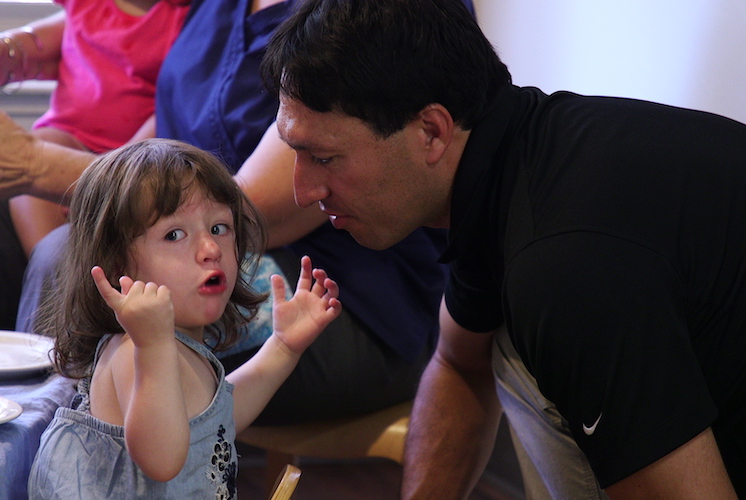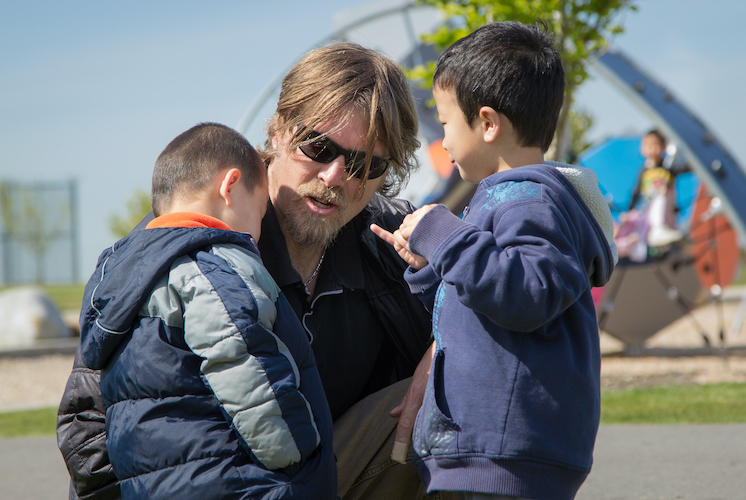 Infants, toddlers, and preschoolers develop within the context of relationships with significant adults in their lives. The nature of these relationships has a profound impact on children. As children observe and interact with familiar adults, they begin to learn how to express and interpret a broad range of emotions. Social and emotional development go hand in hand in the early years.1 They also develop the ability to self-regulate with the support of consistent, responsive relationships. Self-regulation is an important part of becoming a successful learner. This growing ability for children to manage emotions and behavior allows for more positive engagement in learning activities.2
Infants, toddlers, and preschoolers develop within the context of relationships with significant adults in their lives. The nature of these relationships has a profound impact on children. As children observe and interact with familiar adults, they begin to learn how to express and interpret a broad range of emotions. Social and emotional development go hand in hand in the early years.1 They also develop the ability to self-regulate with the support of consistent, responsive relationships. Self-regulation is an important part of becoming a successful learner. This growing ability for children to manage emotions and behavior allows for more positive engagement in learning activities.2
Some researchers view babies' every expression of distress as an opportunity for interaction that will build relationships with an important adult.3 Adults who respond quickly to soothe and comfort a crying infant are helping him master his immediate physical reactions to events and begin to use self-calming, thinking, and, eventually, words as a way of coping. As infants become toddlers and toddlers become preschoolers, they develop more diverse ways of telling adults about their interests and needs. They also acquire greater capacity to act on the environment and interact with peers and familiar adults. Adults use increasingly sophisticated strategies to respond as children develop and learn.
Ideally, adults can support the complete dependency of the newborn and increasingly respect a toddler's growing autonomy and a preschooler's independence. At the same time, the adult is showing the child, "I notice what you do. I care about how you feel. I will keep you safe. I can help you grow." Head Start and Early Head Start staff receive ongoing training in how to use their role as teachers, home visitors, and family child care providers to support this positive development through relationships (45 CFR §1302.34; 45 CFR §1302.35(b)(1); 45 CFR §1302.35(c)(1–3) and (5); 45 CFR §1302.92(b)(5)).
Andre had few experiences being in a large group of children and none being away from his parents. Before Giselle and Rico enrolled him in the home-based option when he was 2 years old, the family lived in a small house in the suburbs. Rico worked and Giselle stayed home to care for Andre. Andre had some contact with other children in the neighborhood, usually at a public playground, as well as occasional visits with his Spanish-speaking aunt, uncle, and three older cousins. However, when Rico lost his job, the family could no longer afford their house. They moved to a small, affordable apartment in the city, but in a less safe neighborhood. This was stressful for everyone. Giselle worried about Andre's safety outdoors, so she kept him inside a lot.
Soon after they moved, Giselle and Rico enrolled Andre in the home-based Head Start program. Home visits were intimate—just the home visitor, Giselle, Rico, and Andre—and they were conducted in Spanish. When Andre went to the group socializations, the group size was small (six to 10 children), many of the children and parents spoke Spanish, and either Giselle or Rico was always there. Andre stayed close to his parents in the group situation and his parents monitored his interactions with the other children very closely. At the first sign of any possible conflict with a child, Giselle and Rico would step in, move Andre away, and give him a toy to play with. Andre's limited experience interacting with other young children was likely contributing to his difficulties engaging with them in more prosocial ways.
 Toddlers and preschoolers watch the people they trust to help them learn how they should behave. They look to a familiar adult for reassurance when a stranger walks into the room or as they hesitate at the top of a slide. They see how adults treat one another and other children to determine their own reactions. Children constantly assess adults' reactions to them for messages of love and their own worth. For young children, getting no response at all to their actions carries its own disturbing messages.
Toddlers and preschoolers watch the people they trust to help them learn how they should behave. They look to a familiar adult for reassurance when a stranger walks into the room or as they hesitate at the top of a slide. They see how adults treat one another and other children to determine their own reactions. Children constantly assess adults' reactions to them for messages of love and their own worth. For young children, getting no response at all to their actions carries its own disturbing messages.
The deeper the adult's understanding of typical development, the easier it will be to respond appropriately. For example, when a toddler looks her father in the eye, says "no" to herself, and still reaches for the electric plug, some adults would label this as deliberately defiant behavior. However, an adult who knows about typical child development will recognize that the toddler may be learning about rules and testing them out. Daddy already said not to reach for the electric plug, but will he still say no this time?
An older toddler or young preschooler engaging in the same behavior may be starting to figure out that other people see things differently from him and gathering evidence as to what this discrepancy means. This child may be checking to see whether the rule about electric plugs that seems to matter so much to Daddy — but not to him — can be sidestepped if he acknowledges he knows the rule "no." Young children are also learning to control their impulses. Even if they know the "don't touch the electric plug rule," they still have trouble stopping themselves without direct support from an adult. Children need adults to provide consistent age-, developmentally, and culturally-appropriate responses to learn rules for behavior. Lack of consistency confuses children and often leads to more "misbehavior."
Some children's behaviors are easier for adults to understand than others. How adults interpret and react to behavior is personal. They interpret behavior through the lens of their family, values, cultures, beliefs, experiences, and expectations. For example, an adult may expect an overtired young infant to fuss and cry and be able to comfort the child easily. That same adult, however, may feel exasperated when an overtired toddler bites another child. Even when she understands that biting is typical toddler behavior, it is hurtful and upsetting, and it can make her angry and less able to comfort the toddler. However, it is important to remember that the toddler who is biting is trying to communicate his wants or needs and is also watching and learning from the adult's reaction.
Each child comes to their Head Start and Early Head Start program with unique experiences and expectations, shaped by their very first moments with their family. Each child brings his or her own personal history to each new moment of exploration or interaction.
When Jemma was born, Andre seemed to accept her presence. But after about a month, Giselle and Rico started to see him take rattles and other toys from Jemma's hands. He also began to pull on his parents' hands or clothes while they diapered, fed, or bathed Jemma. These behaviors did not happen often, and the home visitor gave Giselle and Rico suggestions for how to manage them. They tried to use the suggestions consistently but were not always successful. Giselle and Rico were stressed about their dwindling finances, and the stress sometimes made them lose their patience with Andre. They raised their voices to get him to stop taking Jemma's toys and pulling on them. They started taking his toys away, hoping that would more quickly deter him from taking Jemma's. Andre cringed when they yelled and cried when his toys were taken. His parents comforted him immediately. But the grabbing of toys and pulling did not go away entirely.
Children learn about the depth, continuity, and reliability of relationships through their everyday experiences. They develop a personal history and expectations of relationships. Some children learn that people who love and care for them are always there for them. People in their lives are stable, consistent, responsible, and responsive. However, some children do not experience such relationships with primary adults in their lives. This can negatively affect their social and emotional development (mental health) as well as other areas of development.
The importance of consistent relationships with caring adults cannot be overstated. Children who develop trusting relationships with adults are able to explore and engage in the world around them. They know that the adults will support them in challenging times.4 This is why it is so important for staff in Head Start and Early Head Start programs to develop positive relationships with children and provide consistent responses to their behavior.
1 HHS, ACF, OHS, Head Start Early Learning Outcomes Framework: Ages Birth to Five, 23.
2 Ibid, 10.
3 Robinson, JoAnn L. and Marcela C. Acevedo, "Infant Reactivity and Reliance on Mother During Emotional Challenges: Prediction of Cognition and Language Skills in a Low-Income Sample," Child Development 72, no. 2 (2001): 402–426.
4 HHS, ACF, OHS, Head Start Early Learning Outcomes Framework: Ages Birth to Five, 22.
Read more:
Resource Type: Article
National Centers: Early Childhood Development, Teaching and Learning
Last Updated: October 21, 2020
